Today is the anniversary of John Eliot preaching the gospel to the Massachusett tribe gathered at Nonantum, (Newton, MA) on October 28, 1648, and the conversion of their leader from Musketequid, Waban, who established the Praying Indian Village of Natick.
We finish both the Book of Jeremiah and Paul’s Epistle to Titus in today’s readings.
TODAY’S READING FROM THE OLD TESTAMENT- JEREMIAH 51:54-52:34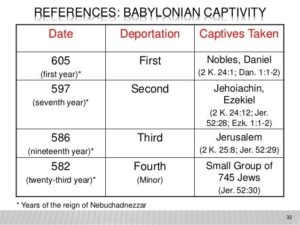
Jeremiah was not able to visit Babylon personally, so he sent Seraiah, the staff officer, quartermaster, who cared for the comforts of the king to deliver his prophecy (Jeremiah 51:59). Seraiah may have been the brother of Baruch.
Seraiah is commanded to read the words of Jeremiah’s scroll aloud, and then pronounce that Babylon will be desolate forever. Seraiah is also assigned the prophetic action of tying a stone to the scroll and throwing it into the Euphrates River, saying, “So will Babylon sink to rise no more because of the disaster I will bring upon her. And her people will fall” (Jeremiah 51:64).
Jeremiah Chapter 52 is almost identical to 2 Kings 24:18- 25:30. The purpose of this chapter is to show how accurately Jeremiah’s prophecies came to pass.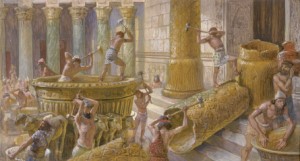
It is estimated that the siege against Jerusalem began on January 15, 588 B.C .and ended two and a half years later on July 18, 586 B.C, when the Babylonian army penetrated the Jerusalem walls (Jer 52:7). Although King Zedekiah flees towards the Arabah, the Babylonian army pursues him and captures him on the plains of Jericho.
All the details we read about in 2 Kings 25:7 are repeated here. Zedekiah’s sons are killed before Zedekiah’s eyes, and then Nebuchadnezzar orders that his eyes be put out and he is taken captive to Babylon.
The destruction of Jerusalem is described in detail. Nebuchadnezzar puts to death the chief priest, also named Seraiah, and the second priest, Zephaniah, and three officers of the temple. Other officials are also put to death.
The book ends with an epilogue concerning the son of Nebuchadnezzar showing favor to Jehoiachin, releasing him from prison and treating him kindly as a royal official with a special allowance and a seat at the king’s table all the rest of his days.
TODAY’S READING FROM THE NEW TESTAMENT – TITUS 3:1-15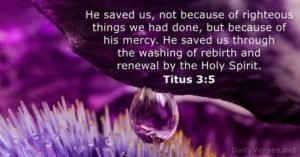
The Apostle Paul continues to give Titus instruction as how to have believers function as a good witness to the gospel. They are to show respect to those in authority and demonstrate the gospel’s power to generate a Christlike demeanor in believers.
Paul then describes the miracle of conversion. Once we were deceived, blinded, and enslaved by worldly passions and pleasures. Now, by God’s gracious intervention through Christ our Lord and Savior, our lives are changed:
Titus 3:4-7 4 But when the kindness of God our Savior and His love for mankind appeared, 5 He saved us, not on the basis of deeds which we have done in righteousness, but according to His mercy, by the washing of regeneration and renewing by the Holy Spirit, 6 whom He poured out upon us richly through Jesus Christ our Savior, 7 so that being justified by His grace we would be made heirs according to the hope of eternal life.
Paul is clear on how to handle divisive people in the body of Christ. You give them due warnings. If they continue to be divisive after two warnings, have nothing to do with them (Titus 3:10).
Paul is writing this letter from Nicopolis, where he has decided to spend the winter. This city was on the western coast of Greece. Paul requests that Timothy visit him there. Tychicus or Artemas could possibly replace Titus and take over his responsibilities on Crete while Titus visits Paul in Nicopolis. Because sea travel was dangerous in the winter, Titus would have to leave soon.
Paul’s final word is a call for all Christians to live productive lives that will bring a blessing to others:
Titus 3:14 14 Our people must also learn to engage in good deeds to meet pressing needs, so that they will not be unfruitful.
TODAY’S READING FROM THE BOOK OF PSALMS- PSALM 100:1-5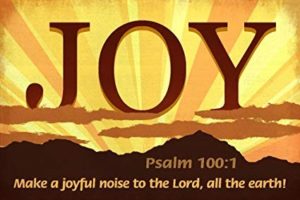
This is a great symphony of praise. May the Holy Spirit call every part of our being to sound forth symphonically in praise to the Lord.
The Psalm is short enough to repeat here:
Psalm 100:1-5 1
Shout joyfully to the LORD, all the earth. 2 Serve the LORD with gladness; Come before Him with joyful singing. 3 Know that the LORD Himself is God; It is He who has made us, and not we ourselves; We are His people and the sheep of His pasture. 4 Enter His gates with thanksgiving And His courts with praise. Give thanks to Him, bless His name. 5 For the LORD is good; His lovingkindness is everlasting and His faithfulness to all generations.
TODAY’S READING FROM THE BOOK OF PROVERBS – PROVERBS 26:18-19
Proverbs 26:18-19 18 Like a madman who throws firebrands, arrows and death, 19 So is the man who deceives his neighbor, and says, “Was I not joking?”
We can too easily dismiss the hurtfulness of our words by saying, “Just kidding”. This habit is dangerously destructive!
PRAY FOR THE NATIONS – SOLOMON ISLANDS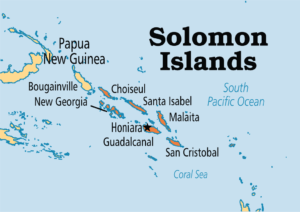
Solomon Islands
Pacific
Geography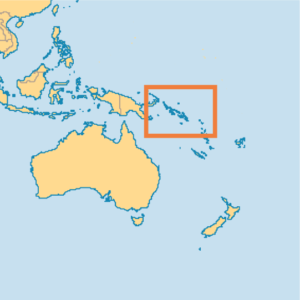
Area: 27,556 sq. km
Six of the seven major volcanic islands of the Solomon Islands, also numerous smaller coral atolls. The seventh, Bougainville Island, is part of Papua New Guinea. The major island and island groups are Guadalcanal, Choiseul, New Georgia, Santa Isabel, Malaita, Makira/San Cristobal, Gela, Santa Cruz and the Russells.
In 1568 the Spanish explorer Álvaro de Mendaña de Neira observed gold on the Solomon Islands, and, thinking it the source of King Solomon’s fabled wealth, he left the islands with their given name. This group of islands east of Papua New Guinea in the Pacific Ocean came under British rule in 1893 and received independence in 1978. The World War II Battle of Guadalcanal took place in the Solomon Islands, and that war became a key factor in unifying the divided peoples of the islands. In some corners of the nation, inheritances include non-material things such as knowledge, wisdom, and magical powers
The economy is based on agriculture, fishing, and forestry, and many mineral resources are underdeveloped. Fish and lumber are the main exports, but the industries are mostly foreign owned. Ethnic tensions led to violence and a 2000 coup and resulted in an Australian-led police force arriving in 2003 to restore order. This violence, along with the closing of key businesses and a moneyless government, led to an economic collapse.
Over the past hundred years, the Church in the Solomon Islands has grown from around 30% of the population to over 95%, serving as a unifying factor for the nation, as well as providing many services to the people. Much syncretism takes place in the Church, with some islanders still praying to their ancestors or practicing animism or black magic. The Church played a key role in reconciliation throughout the recent ethnic conflict and is conducting a Truth and Reconciliation Commission as well. Despite a history of revivals, the Church has begun to stagnate and is in need of a fresh breath. However, because of this history, the Solomon Islands are still home to a group of dedicated prayer warriors.
Population: 535,699 Annual Growth: 2.49%
Capital: Honiara
Urbanites: 18.6%
HDI Rank: 135 of 182 (UN Human Development Reports 2009)
Peoples
Official language: English. Trade language Solomons Pijin, spoken by more than half the population Languages: 71 All languages
Religion
Largest Religion: Christian
|
Religion |
|
Pop % |
Ann Gr |
|
513,200 |
95.80 |
2.4 |
|
|
178,587 |
33.3 |
2.8 |
Challenge for Prayer
In 1568 the Spanish explorer Álvaro de Mendaña de Neira observed gold on the Solomon Islands, and, thinking it the source of King Solomon’s fabled wealth, he left the islands with their given name. This group of islands east of Papua New Guinea in the Pacific Ocean came under British rule in 1893 and received independence in 1978. The World War II Battle of Guadalcanal took place in the Solomon Islands, and that war became a key factor in unifying the divided peoples of the islands. In some corners of the nation, inheritances include non-material things such as knowledge, wisdom, and magical powers.
The civil war of 1998-2003 paralyzed the nation on a number of levels and left many thousands uprooted and in need of practical help and spiritual counselling. Though outside intervention-imposed peace and disarmed the ethnic militias, a deeper malaise in the nation remains. Pray for the effectiveness of the Truth and Reconciliation Commission, the Winds of Change movement for fairer elections and political processes and the continued ministry of Women for Peace. Pray for true forgiveness and reconciliation that come only through repentance. Without these, the nation can never really progress.
PRAYER: O God, You are our Only Savior. And it is not by any works of righteousness that we have done, but You have saved us according to Your mercy and the washing of regeneration and the renewing by the Holy Spirit. We marvel at the grace we have received, that You should lavish Your love upon us and call us Your children. Our desire is to give you praise and to live productive lives that will bless others and be pleasing to You. In Jesus’ Name. Amen.
Pastor David
